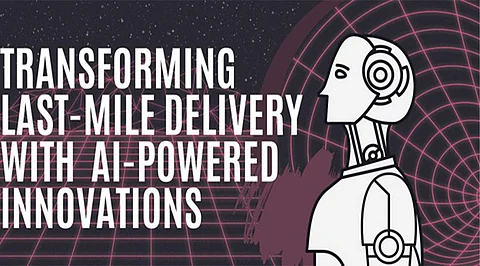

In a fast-changing digital world, the last mile continues to be the most complicated and costly aspect of urban logistics. A specialist in AI-driven logistics, Abdul Muqtadir Mohammed studies how changing methodologies such as generative AI and multimodal learning can change this course. His investigations reveal how these technologies are affecting last-mile delivery in ways that enrich efficiency, sustainability, and customer happiness.
Conventional last-mile delivery modalities have its effect on various inefficiencies such as the inaccuracy of address data, congestion of road traffic. The problem of poor resource allocation has led to the uptake of the AI-based solutions in addressing these gaps. Generative AI, through the large language models, refines the accuracy of an address by geolocation error reduction. In addition, vision-language models help to evaluate the environment within which deliveries are made better to navigate through complex urban landscapes. They further improve route planning under the geospatial foundation models, ensuring that deliveries happen quicker and more reliably.
These AI technologies work within themselves to create a delivery optimization system holistically. Machine-learning algorithms analyz historical data on deliveries to inform a prediction related to peak times and bottlenecks to help companies readjust their resources proactively. Real-time traffic analysis and weather pattern forecasting allow dynamic adjustment of routes to avoid delays. Demand forecasting is an intelligent AI technology that helps logistics providers optimize warehouse locations and inventory management, leading to reduced operational costs and carbon emissions. As a result, this all-inclusive application of different capabilities of AI creates a resilient and adaptive delivery network that holds up to the growing complexities of urban-logistics there are and keeps the service levels at a very high standard.
One of the key innovations in last-mile delivery is the application of multimodal learning, which allows AI systems to process diverse data sources simultaneously. With the help of integrating real-time traffic and weather conditions along with the historical delivery data, the models provide adaptive solutions for urban logistics challenges. Evidence of this breakthrough is the 45% reduction in unsuccessful attempts to deliver goods and a drastic increase in customer satisfaction. It's not just about optimization, however; this revolution in multimodal learning encompasses many additional new developments, including customer feedback loops and delivery personnel insights alongside local event schedules to better inform the systems about the delivery dynamics. Machine learning algorithms can make continual changes to the predictions by studying successful delivery patterns and forecasting possible problem areas before they even appear. All of this contributes to the operational efficiency of a delivery network that is more resilient and responsive to changes as they happen.
Routing is one of the most efficient ways to save money and protect the environment. Dynamic routing systems powered by AI process real-time data to recommend routes that reduce delivery time by an average of 32%. Thus, they foster fuel savings and lessened carbon emission, making urban delivery more sustainable. Besides, there has been an improvement in vehicle capacity utilization, which has gone up by 23%, ensuring resource sustainability. Most AI systems have improved fleet management systems through predictive maintenance algorithms, which have increased vehicle life by reducing unforeseen downtimes and making optimal use of efficiency in operations.
Automation is another frontier in AI-driven logistics. The integration of autonomous delivery vehicles with Internet of Things (IoT) technologies has led to remarkable improvements in efficiency. Smart sensors and real-time data analytics enable autonomous vehicles to navigate urban environments seamlessly. This integration has resulted in a 43.8% reduction in delivery costs per package, proving that AI can enhance both economic and operational efficiency.
AI-driven last-mile delivery is not only about efficiency but also about sustainability. The use of intelligent delivery consolidation strategies has reduced urban traffic congestion and emissions. Studies have shown that AI-powered logistics solutions can cut carbon footprints by up to 26%. With the rise of electric vehicles and optimized delivery routes, AI is paving the way for greener urban logistics.
This provides a great entry point into last-mile logistics for predictive analytics. AI models can foresee demand spikes, optimize resource utilization, and thus reduce operational costs by almost 23%. They can predict the delivery time accurately through historical trends, thus providing good planning and customer satisfaction. Cities using AI-enabled predictive analytics have achieved a 42% reduction in delivery vehicle traffic congestion.
The role of AI is on the rise in last-mile delivery with developing technology innovations. Its smart lockers, real-time tracking, fully automated delivery systems, and others will soon be established to support efficiency. With this, AI logistics will soon meet the upcoming demands of e-commerce and will contribute much to sustainable urban development.
In other words, as global leaders in AI-driven logistics, Abdul Muqtadir Mohammed's is revolutionizing how cities are trying to develop last-mile delivery networks, pioneering the new standards for efficiency and sustainability. AI-driven solutions have now taken forward-looking logistics into their trip. As organizations waking up to embrace these innovations redefine their operations, they have positioned themselves on the frontier of an era where efficiency goes hand in hand with cost-effective and sustainable practices.
